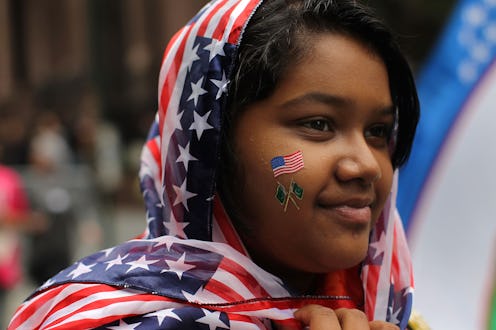News
How To Be An Ally To Muslim Women Every Day

March 27 marked the first-ever Muslim Women's Day, and organizations around the country are celebrating this amazing and diverse worldwide group of people. In recent months, Muslim women like Linda Sarsour have made headlines by being accomplished badasses leading the resistance to Donald Trump's presidency, but this day is about so much more than figureheads — it's about standing up for and celebrating women who all too often are forgotten or used as political fodder. There are tons of ways you can be an ally to Muslim women every day, and Muslim Women's Day is a great place to start.
Despite recent attention paid to the achievements and strength of Muslim women and girls, they still remain a misunderstood and often persecuted group in the U.S. and Europe. Mainstream feminism has often misjudged Muslim women in their attempts to "save" them, and Islamophobia unduly affects Muslim women, especially those who choose to cover and therefore more "noticeably Muslim."
Like other oppressed groups, Muslim women deserve allyship, respect, understanding, and an appreciation of our differences. Muslim women are by no means a monolithic group, but there are some easy and powerful ways you can be a better ally to us.
1. Learn Our History.
The history of Muslim women flies in the face of the myth that they are victims of an oppressive patriarchal society. We have so many historical figures and groups to celebrate — Khadija bint Khuwaylid, one of the the wives of the Prophet Muhammad (peace be upon him) who was a powerful businesswoman and philanthropist; Nana Asma'u, a Nigerian poet and scholar who made educating Muslim women her life's work in the 19th century; or Benazir Bhutto, Pakistan's first female prime minister, who was assassinated in 2007.
Whether advocates of Islamic feminism or revolutionaries during the Arab spring, Muslim women have a rich history that's often suppressed in surface-level conversations about women in Islam.
2. Respect Our Diversity.
In spite of media portrayals that lead people to believe all Muslims are Arab and all Arabs are Muslim, there are Muslim women of every race and many ethnicities and nationalities. The experiences of Latina Muslims are different from those of Black Muslim women, and of Arab Muslim women, and of Southeast Asian Muslim women, and of white Muslim women.
3. Don't Assume You Know What We Look Like.
Queer Muslims also live at the intersection of so many identities, and other than hijab, there's no catch-all way to tell what a Muslim woman looks like. When you meet someone who is Muslim (especially if they don't cover), don't assume you know what their life is like or act surprised because they "don't look Muslim." Instead, treat them with the respect you'd treat anyone else.
4. Don’t Speculate Or Ask About Our Sex Lives.
One of the weirder side effects of the "oppressed Muslim women" myth is the non-Muslim interest in our sex lives. I shouldn't have to explain why it's offensive to ask someone how and if they have sex — that's personal and private information that doesn't need to be shared with anyone but one's partners. Like everyone else, our sex lives are individual, and there are definitely Muslim women who do choose to have sex outside of marriage alongside the many who do choose to wait.
If your Muslim friend is dating someone, don't ask them about sex unless they bring it up. This isn't just respect for their privacy and personal boundaries — it's another way of resisting the urge to "other" us or view us as exotic or weird.
5. Ask Us Individually How You Can Help.
One of the biggest points I try to drive home when discussing Muslim women and feminism is that we, like any other group, are not a cohesive unit and do not all share the same wishes or needs. That said, rising Islamophobia presents the need for many of us to have support from non-Muslims, and one of the most powerful ways to help us it to just ask.
Whether speaking with a Muslim woman friend, working in activist spaces, or engaging with Muslim women online, simply asking "what do you need?" or "how can I help?" can make a huge difference. The responses will vary because, again, we're individuals — I can't pretend to speak for Black Muslim women or hijabis who often face violence due to their "noticeable difference" — but I know that my biggest need lately is to have support from my community in the form of food and conversation.
Allyship is one of the best things you can offer to Muslim women, and making sure to be respectful while checking your preconceived notions at the door lets us know that you're serious about helping us resist, survive, and thrive during these troubling times.